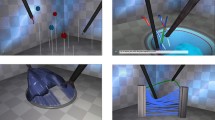Abstract
Background
Previous studies have shown a correlation between previous video game experience and performance in minimally invasive surgical simulators. The hypothesis is that systematic video game training with high visual-spatial demands and visual similarity to endoscopy would show a transfer effect on performance in virtual reality endoscopic surgical simulation.
Methods
A prospective randomized study was performed. Thirty surgical novices were matched and randomized to five weeks of systematic video game training in either a first-person shooter game (Half Life) with high visual-spatial demands and visual similarities to endoscopy or a video game with mainly cognitive demands (Chessmaster). A matched control group (n = 10) performed no video game training during five weeks. Performance in two virtual reality endoscopic surgical simulators (MIST-VR and GI Mentor II) was measured pre- and post-training. Before simulator training we also controlled for students’ visual-spatial ability, visual working memory, age, and previous video game experience.
Results
The group training with Half Life showed significant improvement in two GI Mentor II variables and the MIST-VR task MD level medium. The group training with Chessmaster only showed an improvement in the MIST-VR task. No effect was observed in the control group. As recently shown in other studies, current and previous video game experience was important for simulator performance.
Conclusions
Systematic video game training improved surgical performance in advanced virtual reality endoscopic simulators. The transfer effect increased when increasing visual similarity. The performance in intense, visual-spatially challenging video games might be a predictive factor for the outcome in surgical simulation.

Similar content being viewed by others
References
Grantcharov TP (2008) Is virtual reality simulation an effective training method in surgery? Nat Clin Pract Gastroenterol Hepatol 5:232–233
Seymour NE, Gallagher AG, Roman SA et al (2002) Virtual reality training improves operating room performance: results of a randomized, double-blinded study. Ann Surg 236:458–463 discussion 463–454
Ahlberg G, Enochsson L, Gallagher AG et al (2007) Proficiency-based virtual reality training significantly reduces the error rate for residents during their first 10 laparoscopic cholecystectomies. Am J Surg 193:797–804
The Entertainment Software Association. Industry facts. http://www.theesa.com/facts/index.asp. Accessed 10-06, 2008
Enochsson L, Isaksson B, Tour R et al (2004) Visuospatial skills and computer game experience influence the performance of virtual endoscopy. J Gastrointest Surg 8:876–882
Rosser JC Jr, Lynch PJ, Cuddihy L et al (2007) The impact of video games on training surgeons in the 21st century. Arch Surg 142:181–186
Rosenberg BH, Landsittel D, Averch TD (2005) Can video games be used to predict or improve laparoscopic skills? J Endourol 19:372–376
Kolga Schlickum M, Hedman L, Enochsson L et al (2008) Transfer of systematic computer game training in surgical novices on performance in virtual reality image guided surgical simulators. Stud Health Technol Inform 132:210–215
Chessmaster, 10th edition [computer program] (2004) Montreuil-sous-Bois, France, Ubisoft
Half-Life [computer program] (1998) Los Angeles, Sierra On-Line
Hedman L, Klingberg T, Kjellin A et al (2006) Working memory and image guided surgical simulation. Stud Health Technol Inform 119:188–193
Wanzel KR, Hamstra SJ, Anastakis DJ et al (2002) Effect of visual-spatial ability on learning of spatially-complex surgical skills. Lancet 359:230–231
Felländer-Tsai L, Kjellin A, Wredmark T et al (2004) Basic accreditation for invasive image guided intervention. J Inform Techn Healthcare 3:165–173
Gallagher AG, Lederman AB, McGlade K et al (2004) Discriminative validity of the Minimally Invasive Surgical Trainer in Virtual Reality (MIST-VR) using criteria levels based on expert performance. Surg Endosc 18:660–665
Hedman L, Strom P, Andersson P et al (2006) High-level visual-spatial ability for novices correlates with performance in a visual-spatial complex surgical simulator task. Surg Endosc 20:1275–1280
Peters M, Laeng B, Latham K et al (2000) A redrawn Vanderberg and Kuse mental rotation test: different versions and factors that affect performance. Brain Cognition 28:39–58
Hedman L, Klingberg T, Enochsson L et al (2007) Visual working memory influences the performance in virtual image-guided surgical intervention. Surg Endosc 21:2044–2050
WAIS-III (2003) San Antonio, TX, Pearson Assesment
Daniel WW (1995) Biostatistics: A Foundation for Analysis in the Health Sciences, 6th edn. John Wiley & Sons, New York
The SAS system 9.1 [computer program] (2003) Cary, NC, SAS Institute Inc
Sigma Stat 3.5 [computer program] (2005) San Jose, CA, Systat
Klingberg T, Fernell E, Olesen PJ et al (2005) Computerized training of working memory in children with ADHD—a randomized, controlled trial. J Am Acad Child Adolesc Psychiatr 44:177–186
Buonomano DV, Merzenich MM (1998) Cortical plasticity: from synapses to maps. Annu Rev Neurosci 21:149–186
Acknowledgments
This is an independent study fully supported by unrestricted grants from Karolinska Institutet and Marianne and Marcus Wallenberg Foundation.
Author information
Authors and Affiliations
Corresponding author
Rights and permissions
About this article
Cite this article
Schlickum, M.K., Hedman, L., Enochsson, L. et al. Systematic Video Game Training in Surgical Novices Improves Performance in Virtual Reality Endoscopic Surgical Simulators: A Prospective Randomized Study. World J Surg 33, 2360–2367 (2009). https://doi.org/10.1007/s00268-009-0151-y
Published:
Issue Date:
DOI: https://doi.org/10.1007/s00268-009-0151-y




